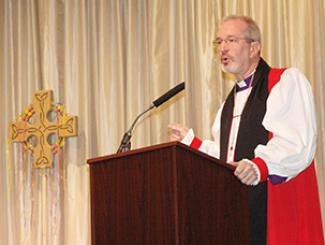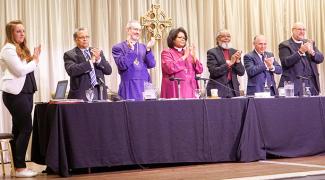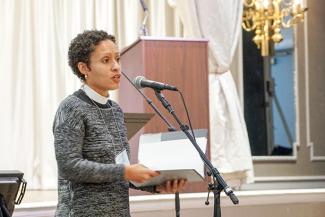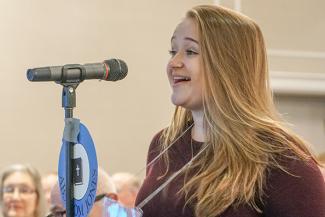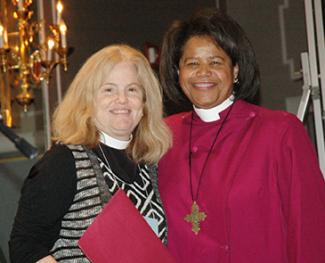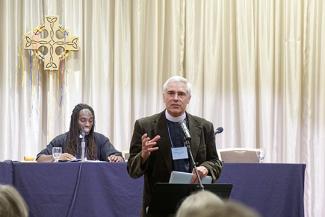This year’s Diocesan Convention set the Episcopal Church in eastern Massachusetts on a path toward “embracing brave change” by adopting a new mission strategy that calls for reimagining congregations, building relationships and engaging the world.
“Strategizing to recreate the church of the past will not reveal to us how to be the church of Jesus Christ today and tomorrow,” Bishop Alan M. Gates said in his address to the convention. He urged “metanoia”—a change of mind that allows for letting go of past perceptions and of fear.
“We must celebrate and give thanks for the blessings of our history, to be sure. And we must listen for new ways in which God is calling us to respond to the world, even now. And this, my friends, is what is meant by ‘embracing brave change.’ And this is what our proposed mission strategy is all about,” Gates said.
The annual legislative gathering, held Friday-Saturday, Nov. 4-5 at the Holiday Inn in Mansfield, drew a higher-than-usual attendance of 620 people, including 492 voting clergy members and lay delegates.
In addition to its mission strategy deliberations, the convention adopted resolutions on civil discourse, continued efforts to end gun violence and increased awareness about community funding for affordable housing. It also approved the proposed $9.2-million budget for 2017 and elected deputies to the Episcopal Church’s 2018 General Convention.
Mission strategy
A significant focus of the convention’s program time was the proposed new mission strategy. Design, listening and drafting teams have been at work successively since May of 2015 to craft the new strategy that will guide the shared ministry of the diocese and the allocation of diocesan resources for at least the next three years.
“God is calling to us to look ahead and to embrace brave change,” the strategy states in its introduction. It calls on the diocesan community to do this this by “reimagining our congregations,” “building our relationships” and “engaging our world,” and lays out numerous recommended goals and initial actions in each of the three thematic categories.
The convention adopted the mission strategy as proposed, with one amendment to make an explicit commitment to ministry with children, youth and families in the section on reimagining congregations.
Before the Saturday vote, convention-goers spent time during two plenary sessions reading and discussing the proposal together and hearing a review of the process that led to its creation. That process included the participation of about 1,100 people from 120 congregations across the diocese, drafting team members said in their presentation to the convention.
In his address to the convention on Saturday morning, Bishop Gates praised the multiphased process that led to the creation of the new mission strategy and acknowledged all who led and participated in it.
“It has mattered to me that the process by which we have arrived at the proposed mission strategy be reflective of the way that I hope we can serve together as bishop and diocese in the years ahead: broadly participatory; deliberate; listening for the Holy Spirit; patient; transparent; imperfect—no doubt—and open to hearing about that; consensus-seeking; candid, yet hopeful. The mission strategy is, I believe, an honest yet hopeful product,” Gates said.
“This mission strategy strives to dwell between a 30,000-foot document that would have articulated general values and vision but be of no real use in guiding resource allocation and direction, or a 2,000-foot document that would have articulated a handful of tactical next steps, but be outdated very soon,” Gates said.
“What we have is in between: a vision and some initial steps, while still requiring a good bit of strategic thinking, prioritizing, praying and fleshing-out. Those will be our steps in the next year and more,” he said.
The bishops and Diocesan Council are in the process of appointing an Implementation Organizing Team to carry forward the work of actualizing the new mission strategy.
The complete mission strategy as adopted is available here.
Budget
The convention approved the $9.2-million diocesan budget proposed for 2017. It includes $7.1 million in core revenue and expenses and $2.1 million in supplemental ones, a slight increase over the 2016 budget of $9 million. (Core expenses are funded by parish assessments and investment income from diocesan endowments and trusts, while supplemental expenses are funded through alternative sources such as gifts, grants, reserves and contributions from the investment income from funds directed by the bishop.)
The 2017 budget generally continues current program expenses, with start-up funds available to the Diocesan Council to cover expenses for new mission strategy implementation as that work gets underway in the upcoming year, diocesan treasurer Lisa Garcia and the Rev. Stephen Voysey, outgoing Budget Committee chairperson, said in their written introduction to the budget.
The budget motions generated 45 minutes of discussion prior to the vote, much of it focused on parish assessments. Six people spoke specifically in opposition to or with concerns about assessments, four of them from Cape Cod parishes and two from nearby Mt. Hope-Buzzards Bay Deanery parishes.
The current formula, in place since 2010, calculates a parish’s assessment at 15.5 percent of expenses reported three years prior (the most recent parochial report data available at the time the assessment calculations must be made), minus a $6,000 deduction. (By comparison, the Episcopal Church asking of dioceses is 18 percent in 2016, 16.5 percent in 2017 and 15 percent in 2018. The General Convention set the graduated decrease in 2015.)
"My argument is not with assessment as such," the Rev. Adam Linton of the Church of the Holy Spirit in Orleans said during the convention’s Saturday legislative session. "I know that we all have a share in our greater work in our diocesan community. I know we're going to be addressing these issues, and the new mission strategy gives me great hope," he said, "but I have to name it today. Many of our congregations are finding the level of assessment not only unsustainable but unbearable, and even wonderful organizations, pious ones filled with dear and rightly beloved people, can, well, we can insulate ourselves against change, and so I am having to urge a no vote on this just as a clear expression among ourselves that we can't keep on doing business just the way we have."
Delegate Steve Koehler, also from Holy Spirit in Orleans, said the financial realities faced by many parishes, including his own, are not reflected in the proposed budget.
"We are not able to give salary increases to our staff. We are not able to comply with the TCC [Total Clergy Compensation guidelines]. We're looking seriously at cutting programs and reducing staff. We are not providing properly for the maintenance of our facilities. We are drawing too rapidly on our endowment funds, and we are not able to fund new initiatives for the future for our growth," he said.
"Continued annual growth in diocesan revenue and expenses as proposed is simply not sustainable in our current environment," Koehler said. He suggested an alternative pledging process "which asks each parish to respond to God's call with a resource commitment to our diocese in exactly the same way that our parishes ask their members to respond. The biblical tithe could be a guide."
The Rev. Judith Davis of Christ Church in Harwich Port said she supported the work that went into preparing the budget but would be voting against it. "One of the issues in a parish my size is we have a very small endowment from which we are taking money of the principal each year to pay our operating expenses, including the assessment. We're facing cutting staff which is all we have left to cut in order to be able to be sustainable," Davis said.
Delegate Betty Furness of St. Peter's Church in Dartmouth described how her parish is beginning to grow after some years of setbacks and diminishment, but said that catching up on past-due assessments is an obstacle. "I don't really understand how we will possibly ever continue to be able to grow and be able to pay off this money that we're owing," she said. "We're trying our best," she said, "but it's like a hamster in the wheel."
Michael Pierce, a delegate from Trinity Church in Canton, encouraged members of convention to participate in the budgeting process. "Every spring there are budget hearings and strategic ministry hearings which almost nobody attends,” Pierce said. "If people have concerns about the budget, my guess is that the Budget Committee would like to have you show up in the spring with your concerns so that at the beginning of the process some of these things can be addressed, because at this point it's a little late in the game."
The Rev. Jane Bearden of Trinity Church in Haverhill, an outgoing member of the Budget Committee, was among the three people who spoke in favor of the proposed budget. "If in fact we're going to embrace brave change, if in fact we're going to ask our parishes, our congregations, to engage in the work of social justice in their local communities and with our neighbors, then we cannot possibly focus on a theology of scarcity in our budgeting process," she said.
"We've got to think out of faith, we've got to think much more broadly, and I think that we have to address the needs of parishes that do not have large endowments," Bearden said, including "how we might be a little bit more open and willing to engage in ministry beyond our own little congregations."
The Rev. Libby Gibson of St. Mary's Church in Barnstable asked for a process whereby parishes could be heard on the assessment question. "I know so many of us have been inspired by the extraordinary process of the mission strategy work and wonder if a process for listening to parishes around the assessments or the pledge or the giving has been proposed that would be equally rigorous, transparent, open and relational, because many of us do feel that this is a tax since it's a governing body telling us what to do," she said.
An assessment formula review process is, in fact, already underway by a committee formed by Diocesan Council earlier this year.
Diocesan treasurer Lisa Garcia reported that the assessment formula review committee has met four times and has gathered good but incomplete information.
"We realize that the work we're doing needs to coincide with the work of the mission strategy efforts," she told the convention.
"One should inform the other. The level of assessments, the level of resources, should be informed by the work that we feel that we're called to do. Everyone has a voice in that,” Garcia said. "Please consider this an invitation to be part of these conversations that we'll make sure are announced and communicated to all of you."
Resolutions
The convention approved the four resolutions proposed for its consideration, two arising from the tenor of this year’s election season, another on the diocese's ongoing commitment to antiviolence work and a fourth on affordable housing.
One of the resolutions advocates civility in political conversation. It condemns “actions of politicians and political candidates that cause vitriolic division between communities,” and it invites neighboring dioceses take a similar stance. A section of the resolution calling members of the diocese to refrain from campaign activities that degrade opponents was amended to make clear that such a call "not be construed to limit any person's exercise of free speech."
The convention also adopted a resolution calling for reconciliation following the divisive rhetoric of the presidential election, urging parishes to engage in the study of conflict resolution and inviting other dioceses to make a similar call for healing and reconciliation following the election.
A third resolution approved by the convention calls for continued support for the diocese’s Jorge Fuentes Antiviolence Task Force and its B-PEACE for Jorge campaign.
“I move this resolution with a prayer on my heart for our diocese to continue to grow into our call to work for peace and justice for all people and with a sense of urgency about the epidemic of violence which is taking lives even as I speak right now,” the Rev. Amy McCreath of the Church of the Good Shepherd in Watertown said.
The resolution urges congregations to engage in specific actions around gun law reform; support for youth jobs and partnerships with underresourced schools; public advocacy to end gun violence; and ongoing conversations and programs to increase understanding about causes and consequences of gun violence, including the role of law enforcement.
Delegate Michael Pierce of Trinity Church in Canton spoke against the resolution out of his concern that although Diocesan Convention formalized the task force and its charge in 2012, it has not been developed into a diocesanwide program.
“Diocesan Council did not do what was necessary to structure it as a diocesan program, and the ad hoc committee sort of just became the diocesan committee, and because of that there hasn't been a growth of involvement of people from all around the diocese in the B-PEACE program,” Pierce said. “I would urge that we defeat it [the resolution] with a hint to the Diocesan Council to do what's necessary to turn the B-PEACE program into a genuine diocesan program with real ease of access for everybody in the diocese.”
The Rev. Noah Van Niel of the Parish of St. John the Evangelist in Hingham disagreed and spoke in favor of continuing the work. “There has been a broadening of the leadership and the participation in the peace-building which is deeply, deeply a part of our Christian call. I believe that we need to continue in this work because the work is far from done, and I believe that a yes vote on this resolution will allow us to continue to do that and continue to broaden the participation across our diocese, and across our country and our world about saving people's lives and stopping the killing,” Van Niel said.
The Rev. Jane Gould of St. Stephen’s Church in Lynn also spoke in favor of the resolution, noting that her congregation on All Saints’ Sunday would be remembering a young man shot by Lynn police and another killed in drug-related gun violence.
“My hope, given the mission strategy we just passed, is that we will see B-PEACE extend its reach proactively beyond the city of Boston,” Gould said.
No amendments were offered and the resolution was adopted as proposed.
The fourth resolution approved by the convention encourages congregations to address the pressing need for affordable housing in their communities and to become familiar with and share information about the Community Preservation Act (CPA), a state program through which participating cities and towns can create a community fund for open space protection, historic preservation, affordable housing and outdoor recreation. The money is raised locally through a property tax levy surcharge. At convention time, 161 Massachusetts cities and towns had adopted the CPA; Boston voters subsequently adopted it on Nov. 8.
The convention approved the resolution after amending it with language to strengthen its focus on affordable housing efforts. The amended version encourages the congregations of the diocese "to engage in advocacy and action to identify potential housing projects and to work to ensure that Community Preservation Act funds are distributed in ways that focus on increasing affordable housing."
Full texts of resolutions in their final form are available here.
Elections
Diocesan Convention elected eight deputies to the Episcopal Church’s General Convention in July 2018, but because of a procedural error, it was several days before correct results could be reported.
The diocesan constitution stipulates the use of a proportional representation method of election, whereby voters rank nominees in order of preference.
A number of people noticed after the election results had been announced to the convention on Saturday that those results showed the delegates in both the clerical and lay orders to have been elected in the same ranked order as their names appeared on the ballot.
“This seemed an unlikely coincidence,” the Rev. Canon Bill Parnell, Canon to the Ordinary, wrote to delegates and clergy in a Nov. 10 e-mail announcement.
A manual recount of the paper ballots requested by the bishop on Nov. 7 confirmed the accuracy of the initial ballot tallies, but re-running those tallies through the election software that calculates results—and a subsequent consultation with the software company's technical staff—revealed that the tally data had been incorrectly formatted for input into the software, resulting in incorrect rankings.
In the clerical order, the same four priests were certified as elected, but their ranking changed. In the lay order, the recalculation resulted in one change in the roster as well as changed rankings.
In corrected, certified order, those elected General Convention deputies are, in the lay order: Byron Rushing, Fredrica Harris Thompsett, William C. Boyce and Samuel J. Gould. In the clerical order, they are: The Rev. Mally Ewing Lloyd, The Rev. Edwin Daniel Johnson, The Rev. Thomas J. Brown and The Rev. Karen B. Montagno.
All nominees, whether elected or not, were informed of the corrected results and given a report of the tally details before the wider correction announcement was made on Nov. 10.
Among its other business, the convention:
• Approved clergy compensation guidelines for 2017.
• Amended, on second reading, Article 2 of the diocesan constitution, clarifying that all members of Diocesan Council are entitled to vote at the convention, and approved a first reading of three proposed amendments that would revise the constitution to more accurately reflect the current age requirements and policies of the Diocesan Youth Council. A second reading of the latter is required next year before those amendments go into effect.
• Heard a report from a contingent who traveled to stand with the Standing Rock Sioux Nation and others opposed to the route of the Dakota Access oil pipeline, and approved a courtesy resolution to "continue our tradition of mutuality and familial relationship between the Episcopal Church and the people of Standing Rock by joining in solidarity alongside them in continued prayer and action in defense of clean water and the sanctity of their land."
An offering of $4,745 was collected for hurricane relief efforts in Haiti through Episcopal Relief & Development.
--Tracy J. Sukraw
Links:
Diocesan Convention 2016 actions
Video and text of Bishop Gates’s address
Video of greeting from Massachusetts Council of Churches
Photo gallery

